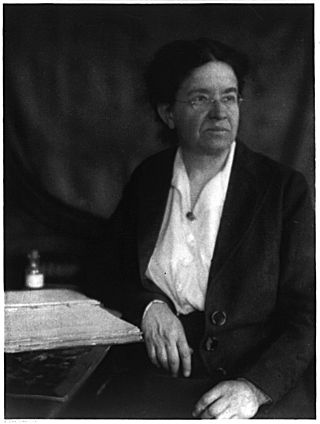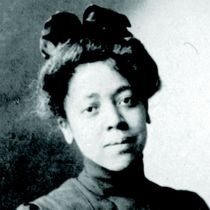Related Research Articles

Florence Rena Sabin was an American medical scientist. She was a pioneer for women in science; she was the first woman to hold a full professorship at Johns Hopkins School of Medicine, the first woman elected to the National Academy of Sciences, and the first woman to head a department at the Rockefeller Institute for Medical Research. During her years of retirement, she pursued a second career as a public health activist in Colorado, and in 1951 received the Albert Lasker Public Service Award for this work.
Health information exchange (HIE) is the mobilization of health care information electronically across organizations within a region, community or hospital system. Participants in data exchange are called in the aggregate Health Information Networks (HIN). In practice, the term HIE may also refer to the health information organization (HIO) that facilitates the exchange.

Frances Jacobs was born in Harrodsburg, Kentucky, to Jewish Bavarian immigrants and raised in Cincinnati, Ohio. She married Abraham Jacobs, the partner of her brother Jacob, and came west with him to Colorado where Wisebart and Jacobs had established businesses in Denver and Central City. In Denver, Frances Jacobs became a driving force for the city's charitable organizations and activities, with national exposure. Among the philanthropical organizations she founded, she is best remembered as a founder of the United Way and the Denver's Jewish Hospital Association.
A Patient Safety Organization (PSO) is a group, institution, or association that improves medical care by reducing medical errors. Common functions of patient safety organizations are data collection, analysis, reporting, education, funding, and advocacy. A PSO differs from a Federally designed Patient Safety Organization (PSO), which provides health care providers in the U.S. privilege and confidentiality protections for efforts to improve patient safety and the quality of patient care delivery

Denver Health Medical Center, formerly named Denver General Hospital, is a hospital in the Lincoln Park neighborhood of Denver, founded in 1860. It is one of five Level I Trauma Centers in Colorado. Denver Health Medical Center is one of the primary teaching hospitals in Denver and is affiliated with the University of Colorado School of Medicine.

Rose Medical Center is a part of HCA Healthcare's HealthONE network. With thousands of babies born each year, Rose is colloquially known as Denver's "Baby Hospital." It also provides comprehensive women's care, orthopedics and total joint replacement, heart and vascular care, weight-loss treatment, cancer care, surgical services, internal medicine and emergency care. Ryan Tobin is the President and Chief Executive Officer.
Transitional care refers to the coordination and continuity of health care during a movement from one healthcare setting to either another or to home, called care transition, between health care practitioners and settings as their condition and care needs change during the course of a chronic or acute illness. Older adults who suffer from a variety of health conditions often need health care services in different settings to meet their many needs. For young people the focus is on moving successfully from child to adult health services.
The California Medical Association (CMA) is a professional organization based in California that advocates on behalf of nearly 50,000 physicians in legislative, legal, regulatory, economic, and social issues. The organization was founded in 1856 and is a member of the American Medical Association.

Carl Rüedi was a Swiss pulmonologist and at his lifetime one of the best-known physicians in Graubünden.

The University of Colorado Denver is a public research university located in downtown Denver, Colorado. It is part of the University of Colorado system. Established in 1912 as an extension of the University of Colorado Boulder, CU Denver attained university status and became an independent institution in 1973. CU Denver is the largest research university in Colorado, and is classified among R1: Doctoral Universities - Very High Research Activity. The university's graduate programs award more master's degrees than any other institution in the state, serving roughly 5,000 students annually.
The Center for Personalized Education for Physicians (CPEP) is a non-profit organization, headquartered in Denver, Colorado, and it specializes in physician competency assessment and educational intervention. The organization was established in 1990 as a collaborative effort of seven Colorado healthcare organizations: the Colorado Alliance for CME, the Colorado Foundation for Medical Care, the Colorado Hospital Association, the Colorado Medical Society, the Colorado Physician Health Program, the Colorado Society of Osteopathic Medicine and the University of Colorado School of Medicine.

Justina Laurena Ford was an American physician. She was the first licensed African American female doctor in Denver, Colorado, and practiced gynecology, obstetrics, and pediatrics from her home for half a century.

Frederick J. Bancroft was a surgeon during the Civil War before he settled in Colorado, where he was considered to be "one of the most prominent physicians", according to a San Francisco Chronicle obituary. In the late 1870s, he and the Denver Medical Association created the public health system for Denver, Colorado to improve the health of its citizens. In 1876, Bancroft was the first president of Colorado's State Board of Health. He became Colorado Medical Society president in 1880. Bancroft was a founder and professor of the University of Denver and Colorado Seminary Medical Department in 1881.
The Denver Medical Society is the "Rocky Mountain region's oldest and largest local medical society" It was founded in 1871 to improve public health through education and professional standards. It tackled issues such as epidemics, tuberculosis, and development of sanitation systems, including initiating the construction of the systems sewer system. Between 1889 and 1902, its scope included Arapahoe County. Then, it returned to an organization focused on the city and county of Denver.
Hendrika Bestebreurtje Cantwell is a German-born American retired physician, professor emerita of pediatrics at the University of Colorado Denver, advocate for abused and neglected children, and parenting educator. She was one of the first physicians in the United States to work for a child protection agency, serving with the Denver Department of Social Services from 1975 to 1989. Her work there brought her in contact with an estimated 30,000 cases of suspected child abuse and she testified as an expert witness in thousands of court cases. An author of peer-reviewed journal articles, book chapters, and teaching manuals on the detection and treatment of child abuse, she has also conducted workshops and training programs for professionals throughout Colorado. She was inducted into the Colorado Women's Hall of Fame in 1990.

Mary Barker Bates (1845–1924) was a 19th-century American physician and surgeon, practicing in Salt Lake City and Colorado. She was among the first women first admitted to the Denver Medical Society. She joined the staff of the Women's and Children's Hospital in 1885. She was also a vice president of the Colorado Medical Society. Bates served on the Denver School Board.

Alida Avery (1833–1908) was an American physician and Vassar College faculty member. In Colorado, she was thought to be the first woman licensed to practice medicine in the state. She was also the Superintendent of Hygiene for Colorado. Avery was among the first women first admitted to the Denver Medical Society.
Patricia Anne Acquaviva Gabow is an American academic physician, medical researcher, healthcare executive, author and lecturer. Specializing in nephrology, she joined the department of medicine, division of renal diseases, at the University of Colorado School of Medicine in 1973, advancing to a full professorship in 1987; she is presently Professor Emerita. She was the principal investigator on the National Institutes of Health Human Polycystic Kidney Disease research grant, which ran from 1985 to 1999, and defined the clinical manifestations and genetics of the disease in adults and children. She served for two decades as CEO of Denver Health, an integrated public healthcare system in Denver, Colorado, where she implemented numerous business-based systems to streamline operations, improve patient care, and recognize cost savings. In particular, her introduction of the "Lean" quality-improvement system, based on the Toyota Production System, earned her national recognition. She is the author of more than 150 articles and book chapters, three books, and has received numerous awards for excellence in teaching, physician care, and leadership. She was inducted into the Colorado Women's Hall of Fame in 2004.

AdventHealth University (AHU) is a Seventh-day Adventist institution specializing in healthcare education that is located in Orlando, Florida; Denver, Colorado; and online. It is associated with AdventHealth, which is operated by the Seventh-day Adventist Church. It is a part of the Seventh-day Adventist education system, the world's second largest Christian school system. The physical facilities are located next to AdventHealth Orlando and Centura Health in Denver. The university offers over 20 undergraduate and graduate degrees from associate to doctorate level, including online and post-baccalaureate certificates.

Minnie C. T. Love was an American physician and politician from Denver, Colorado. She was an active suffragist, a member of the Colorado House of Representatives, and a member of the Women of the Ku Klux Klan.
References
- ↑ Tom Sherlock (April 2013). Colorado's Healthcare Heritage: A Chronology of the Nineteenth and Twentieth Centuries Volume One - 1800-1899. iUniverse. p. 547. ISBN 978-1-4759-8025-7.